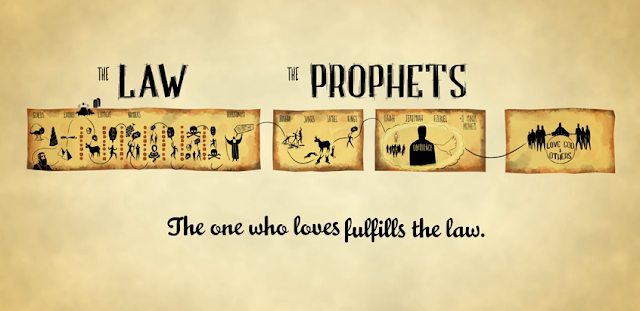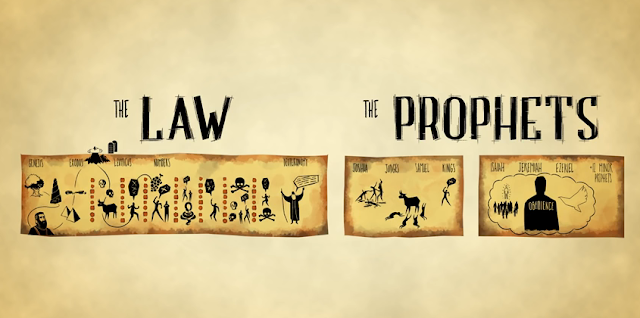The Bible Project | The Law: Creating New Kinds of People Able to Fully Love God and Others
Recent posts on overviews of the Story of God found in the Bible:
The Story of God, the World, and You | Our World Belongs to God | Creation, Crisis, Covenant, Christ, Church, (New) Creation | Jesus as the "True and Better" One | The Messiah | The Covenants | Heaven and Earth | God's Holiness | God's Multi-Ethnic Family | Hell | Sacrifice and Atonement
For this post, I'm including a video and the manuscript for an Animated Explanation of The Law by Tim Mackie and Jon Collins via The Bible Project, a wonderful new and free video series on YouTube.
Animated Explanation of The Law by The Bible Project
Produced by Tim Mackie and Jon Collins
You're most likely familiar with the Ten Commandments in the Bible, stuff we generally take as good advice: don't murder, don't steal, honor your parents, the list goes on. And those are just the first ten. There are actual a total of 613 commands all given to ancient Israel found in the first five books of the Bible, which in Hebrew are called the Torah.
Now the word, "Torah," is usually translated in English as "The Law" because it has all of these laws in it. And as you read them you wonder, "Am I supposed to obey some of these, all of these? I mean, what's the purpose of "The Law"?
Well that translation is kind of confusing. Because while the Torah has laws in it, the book itself is fundamentally a story about how God is creating new kinds of people who are fully able to love God and love others. And when Jesus taught about the Torah, He said that He was bringing that story to its fulfillment.
So let's walk through the story and how it's fulfilled. The story begins with God creating humanity who rebelled. And God chooses Abraham to bless all of the nations through his family who end up in slavery down in Egypt. So then God rescues them.
Then at Mount Sinai God makes a covenant with Israel, like an agreement. And all of the laws that God gives Moses to give to Israel are the terms of that agreement, like a constitution. So some of the laws are about rituals and customs that set Israel apart from the nations. Other laws are about social justice or morality. And by following these, Israel would show the other nations what God is like.
The rest of the Torah is just the complete list of laws that Moses gives Israel? No, the rest of the Torah just continues the story. And the 613 commands are only a selection from that original constitution, and even these have been broken up and placed at strategic points within the story. You see a really clear pattern. Moses gives the first laws to Israel: Don't worship other gods, don't make idols. And then right after that there's a story of Israel breaking those very laws. They worshiped the golden calf. And so Moses gives some more laws and you get some more stories of rebellion. So more laws, rebellion again, some more laws, rebellion. And you start to see the point. No matter how many more laws, they are just going to rebel.
The rest of the Torah is just the complete list of laws that Moses gives Israel? No, the rest of the Torah just continues the story. And the 613 commands are only a selection from that original constitution, and even these have been broken up and placed at strategic points within the story. You see a really clear pattern. Moses gives the first laws to Israel: Don't worship other gods, don't make idols. And then right after that there's a story of Israel breaking those very laws. They worshiped the golden calf. And so Moses gives some more laws and you get some more stories of rebellion. So more laws, rebellion again, some more laws, rebellion. And you start to see the point. No matter how many more laws, they are just going to rebel.
So in the conclusion of the Torah's story, Moses gives this final speech to Israel as the prepare to go into their new home and he tells them, "You guys, I know you're not going to follow all of God's laws. You've proven to me that you're incapable. And Moses says that the problem is their hearts are hard and that they're going to need new transformed hearts if they're ever going to truly follow God's law.
He was right. The story goes on to recount Israel's total failure. They go into the land. They break all the laws. Now the next section of books in the Jewish tradition are the 15 books of the Prophets and they reflect back on the story. For example, Ezekiel said that if Israel was ever going to obey the law, God's Spirit would have to transform their hard hearts into soft hearts. And Jeremiah said that's when obedience to God's commands wouldn't feel like a duty, but they would be written deep within their hearts. And Isaiah promised a future leader, Israel's Messiah, who would lead all the people in obedience to the Law.
Now in Jewish tradition, all of these books together are called the Prophets, even the historical books, because they're continuing the story told from the perspective of the prophets. We have the Law and the Prophets and they're telling one connected story about God's desire to bless the whole world through a people, Israel, who it turns out needs a new heart.
And Jesus saw Himself as continuing that story. So He agreed with the Law and the Prophets when He taught that it's out of the human heart that come the most ugly parts of human nature. It's like the default setting of our hearts is opposed to God's Law. But Jesus also said that He came to solve that problem, in His words, to fulfill the Law. So what does He mean, "To fulfill the Law"?
Well, first He said that all of the demands of the Law in the Torah would be fulfilled by the great command that we are to love God and to love others. So that seems pretty easy. We all want to love. Well, we think we want to love. But Jesus showed that love is far more demanding than we realize.
So He quotes the Law, "Do not murder." And He says that, yes, not killing someone is a very loving thing to do. But then He also says that when you treat someone with disrespect, when you nurse resentment against them, you're also violating God's moral ideal because you're not treating that person with love. So Jesus said that true love ought to extend even to our own enemies. So even though this command seems very simple, Jesus shows our hearts are not currently equipped to even fulfill this basic command of God to love others. And that's kind of a downer.
But where Israel failed, Jesus brought the story to its fulfillment. As Israel's Messiah, He fully loved God and others, and He showed all the nations what God is truly like. He did this through His acts of compassion and mercy, and ultimately by loving His enemies even unto death.
And after His resurrection, He told His followers that He would send God's Spirit to transform their hearts so that they could follow Him and fulfill the purpose of the Law to love God and to love their neighbor.
So this fulfills the story of the Law and the Prophets, or in the words of the Apostle Paul, "The one who loves fulfills the Law" (Romans 13:8).
– Sully







No comments:
Post a Comment